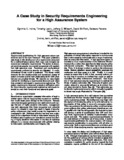Use of Evaluation Criteria in Security Education
| dc.contributor.author | Nguyen, Thuy D. | |
| dc.contributor.author | Irvine, Cynthia E. | |
| dc.date.accessioned | 2012-07-11T15:49:36Z | |
| dc.date.available | 2012-07-11T15:49:36Z | |
| dc.date.issued | 2008-04-01 | |
| dc.identifier.citation | 3rd International Conference on Information Warfare and Security (ICIW 2008) | |
| dc.identifier.uri | https://hdl.handle.net/10945/7157 | |
| dc.description.abstract | Success in information warfare will depend on resilient, reconstitutable cyber assets and the ability to assess and respond to attacks. A cornerstone of this success will be the ability of Information Assurance professionals to develop sound security requirements and determine the suitability of evaluated security products for mission-specific systems. Recognizing the pedagogical value of applying security evaluation criteria such as the Common Criteria (CC) to information security education, we recently introduced a graduate-level Computer Science course focusing on methodical security requirements engineering based on the CC. This course aims to provide students with an understanding of how security evaluation criteria can be used to specify system security objectives, derive security requirements from security objectives, establish life cycle and development processes, and provide an organizational framework for research and development. Although imperfect, the paradigmatic process of the CC provides a usable framework for in-depth study of various tasks relating to system requirements derivation and verification activities: system requirements elicitation, threat analysis, security objectives definition and security requirements expression. In-class discussions address fundamental security design principles and disciplines for information and software assurance (e.g., formal methods and life cycle management) as applied to security requirements derivation. Coverage of advanced CC topics includes high assurance evaluation, international and U.S. scheme interpretation processes, guidance for Protection Profile development, CC evaluation methodology, and composite evaluation. This paper describes the scope and design of a pilot course offering. Laboratory projects focus on the differences between security functional and assurance requirements, mock evaluation of a draft Protection Profile, examination of the interpretation process in the U.S. scheme, and development of a preliminary sketch of a Composed Assurance Package for a hypothetical composed target system that is suitable for use in operational environments requiring medium robustness. Lessons learned and planned refinements of course material and focus are also discussed. | en_US |
| dc.publisher | International Conference on Information Warfare and Security (ICIW 2008), April 2008, Omaha, Nebraska, USA | en_US |
| dc.rights | This publication is a work of the U.S. Government as defined in Title 17, United States Code, Section 101. Copyright protection is not available for this work in the United States. | en_US |
| dc.title | Use of Evaluation Criteria in Security Education | en_US |
| dc.type | Article | en_US |
| dc.contributor.department | Computer Science (CS) | |
| dc.subject.author | Security requirements engineering | en_US |
| dc.subject.author | security evaluation | en_US |
| dc.subject.author | security education | en_US |
| dc.subject.author | information assurance | en_US |
| dc.description.distributionstatement | Approved for public release; distribution is unlimited. |





